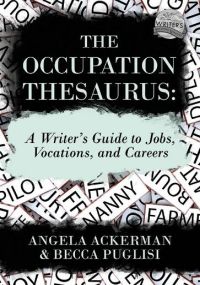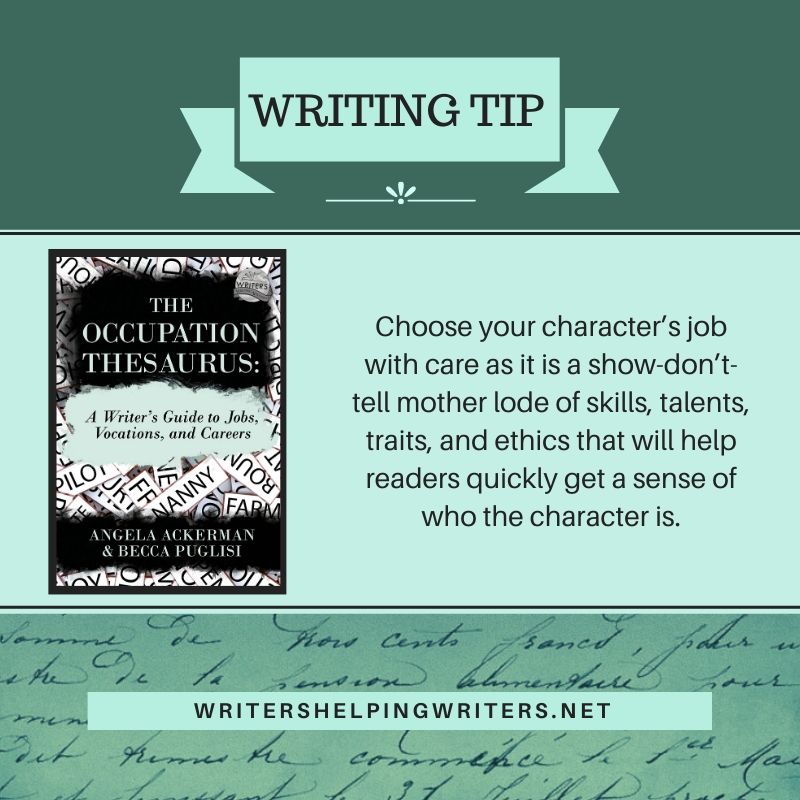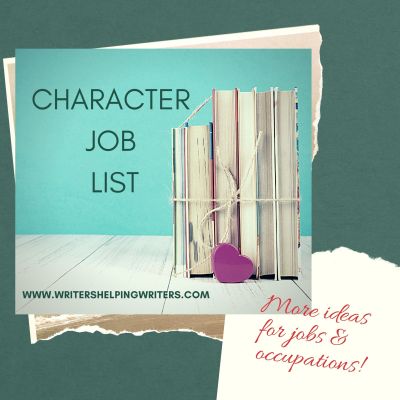What’s Our Character’s Job? Here’s Help (& a Giveaway)!

Some stories or genres require our characters to have certain careers. For example, many types of thrillers need characters with military, spy, or legal system ties. Some contemporary romance series are based on Navy SEALs, NASCAR drivers, firefighters, etc. Some mystery or suspense series follow a private investigator, bounty hunter, etc.
In other stories, our character’s job is like a footnote to their backstory, or it’s simply a way to make the affordability of their living situation believable. (How many “billionaire CEO heroes” seem to never do any work? *rolls eyes*)
Wherever our character falls on that spectrum of job specifics, we need to understand their occupation well enough to know our storytelling options. We might not have a clear idea of how we could tie their job to the story unless we have more insights into their career and what it means for our character.
Character Development Step: Figure Out Their Occupation
The character details we choose to share can say a lot about who someone is, such as their goals, desires, and backstory wound. But beyond the basics, we also want to figure out our character’s occupation, which can offer tons of storytelling potential.
Think about how much your own job affects you:
- How much time do you spend on the job?
- Does it fulfill you or frustrate you?
- Can you separate work from home?
- Is it causing you challenges, creating obstacles…or bringing you joy and helping you live your truth?
Just like us, most characters will have a job, and the work they do will impact their life. Once we figure out their job, we might be able to use it to tie our character’s arc to the plot, provide intense, multi-layered conflict, and shorten the “get to know the character” curve for readers.
7 Ways to Tie Characters’ Careers to the Story
Want a few ideas for how we can tie our story to our character’s career? Here’s a summary of a list I came up with many years ago to get us brainstorming:
Option #1: Job as Story Trigger
A character’s career can be used to kick off the story, either as the page one “hook” or as the inciting incident in one of the first chapters:
- A detective is called to a murder.
- A caterer signs up a new client.
- An office worker can meet their new boss.
And so on. Any one of these new situations could be our story, as characters adjust and grow.
Option #2: Job Informs Backstory
A character’s career can be used to explore why characters are who they are. Beyond being a backstory footnote, the character’s career could tie who the character is today to who they were before:
- A character’s dedication to the family business (or lack of dedication) provides clues about his relationship with his family over the years.
- A discharged soldier suffers from deployment-related trauma that affects how she interacts with others.
Option #3: Job as Motivation
A character’s career can be used to provide motivation for their actions. If a character has a career they consider their career a “mission” or “calling,” their job is what drives them.
Think of first responders, bodyguards, activists, religious believers, etc. They stay with their assignment, regardless of how crazy things get, because they believe in the importance of their job.
Option #4: Job as Conflict
A character’s career can be used to provide conflict, both internal and external:
- External: Competitors, co-workers, or bosses can provide external conflict as story antagonists or villains (or make love interests seem incompatible in a romance).
- Internal: Job requirements could make characters question their priorities or ethics.
Option #5: Job as Goal
A character’s career can be used for a story goal, which could apply to two different situations:
- Similar to the Motivation option, the job might require the character to succeed at a story goal, such as a federal agent who must catch the bad guy to keep her job.
- Or future benefits tied to the job could be a goal, such as if the story goal focuses on getting a promotion/raise or finding a new job.
Option #6: Job as Resolution
A character’s career can be used to provide the resolution to the story problems, such as if their job-related specialized knowledge or skills are the key to overcoming the story’s obstacles. Or in a romance, the couple’s jobs might help them recognize how they’re the perfect match.
Option #7: Job as Characterization
A character’s career can provide insights into their Essence, who they have the potential to be. For example, their job can reveal what characters care about or value, or it can expose their vulnerabilities.
Obviously, we can use more than one of these techniques to tie a character’s career to the story. A character’s current job could be the conflict and the new job could be the goal. A romance could meet through the “job as trigger” device and encounter conflict because of their positions. Etc., etc.
Need more examples or ideas? Read on… *smile*
Introducing The Occupation Thesaurus!
So how can we learn about jobs we’ve never held (and don’t know anyone to ask)? And how can we use that job information to add layers to our character?
Enter the latest release from the Emotion Thesaurus geniuses, Angela Ackerman and Becca Puglisi of Writers Helping Writers! Here’s the scoop from Angela:
“Maybe you haven’t thought much about jobs in the past and how they act as a window into your character’s personality, interests, and skills. It’s okay, you aren’t alone.
The good news is that The Occupation Thesaurus: A Writer’s Guide to Jobs, Vocations, and Careers is going to do all the heavy lifting for you.“
- Does our character’s job pit their morals and ethics against getting ahead?
- Is their job an obstacle standing in the way of what they want?
- Did they choose a job to make up for a past mistake or to avoid a wound?
These ideas and more can be explored with the help of The Occupation Thesaurus. *smile*
Check Out The Occupation Thesaurus
Want to see how The Occupation Thesaurus could help us with our storytelling? Angela and Becca have shared one of the job profiles from the book so we can see the types of ideas and insights each profile digs into, from how the occupation might impact the character to how we could twist the stereotypes.
Check out their FIREFIGHTER example to see all the details included with each profile. And here’s the full list of 124 jobs profiled in The Occupation Thesaurus, from Actor to Yoga Instructor.
(They don’t have Zebra Trainer to give the full A to Z experience, but it’s close…and they do have Animal Trainer that we could adapt for zebras. *snicker*)
Plus, many writers in the Writers Helping Writers community put together additional job profiles for a Contributed Occupation Database. These are jobs the community members have held in the past, so they can share the inside scoop on the conflicts and skills that come with the occupation.
For example, I’ve mentioned before that I worked as a temporary office employee for years during and after college. So I shared my contributed entry profile for Office Temp (which is a very different job from a permanent office position):
Realistic Character Occupations: My Experience as an Office Temp
Other options in the Contributed Database include: Birth Doula, Florist, Music Critic, etc. So between The Occupation Thesaurus and the Contributed Database, we should be able to find a job profile close enough to work for our characters and help us add layers to their characterization and our story. *smile*
Writers Helping Writers Giveaway!
But wait, there’s more! *grin*
To celebrate the release of their new book, Writers Helping Writers has a giveaway happening July 20th – July 23rd. You can win some great prizes, including gift certificates that can be spent on writing services within their Writer’s Showcase.
For example, my workshops are part of the Writer’s Showcase, so if you win one of the gift certificates, you could use that toward the cost of my workshops (or any of the other services in the Showcase, like editing or writing coaches). (*psst* And even if you don’t win, there’s a coupon code for my workshops in the Showcase too. *smile*) Fill out the form in this post to enter!
How much do you think about your character’s occupations? Do you ever struggle to come up with job ideas? Or do you question how to portray different jobs realistically? Do you think this new resource will help? Does it make sense how we can use a character’s job to add layers to their characterization and the storytelling?
Pin It




Thank you so much, Jami <3 So many great ways to utilize the information tied to a career to improve the story, make characters feel more authentic and relatable, and give readers that intimate closeness to the character's hopes, dreams, fears, and beliefs.
Yes! I’ve been looking forward to this release. 😀 Already popped over to Amazon and purchased my Kindle edition. I’ve got a couple story ideas where the characters’ careers/jobs bring them together naturally — like peanut butter and chocolate. I’m currently drafting book 1 of my series and my female lead’s career (cartographer) brings the female lead of the next (I think) book into my character’s world. I’ve also noticed that my character’s careers tend to be less “normal” than teacher, doctor, lawyer, etc.
I pay a lot of attention to how other authors handle showing their character’s jobs. Then I remind myself I’m seeing their finished work and comparing it to my work in progress. But I still fret about my ability to portray a characters’ field of work, their passionate hobby, or even the real-world places they live and work, as if I’ve been there or done it myself.
Just like the rest of life we tend to cut from the page (no one wants to read about all the bathroom trips, etc.!), I think it’s a tricky thing to show enough career to justify the character’s lifestyle, but not so much the reader is bored (or, in the case of some careers, grossed out!).
Love all your posts, Jami. They have been so helpful. Thank you for sharing all your expertise.
I completely agree that we need to pick occupations and write them realistically. Even if someone is on vacation during the story, they’ll make reference to the job, fellow staff or terms they use during work.
Z – I have read quite a few books about Zookeepers!
Zookeepers! Yes, thank you for that Z, Clare. 😀 LOL!